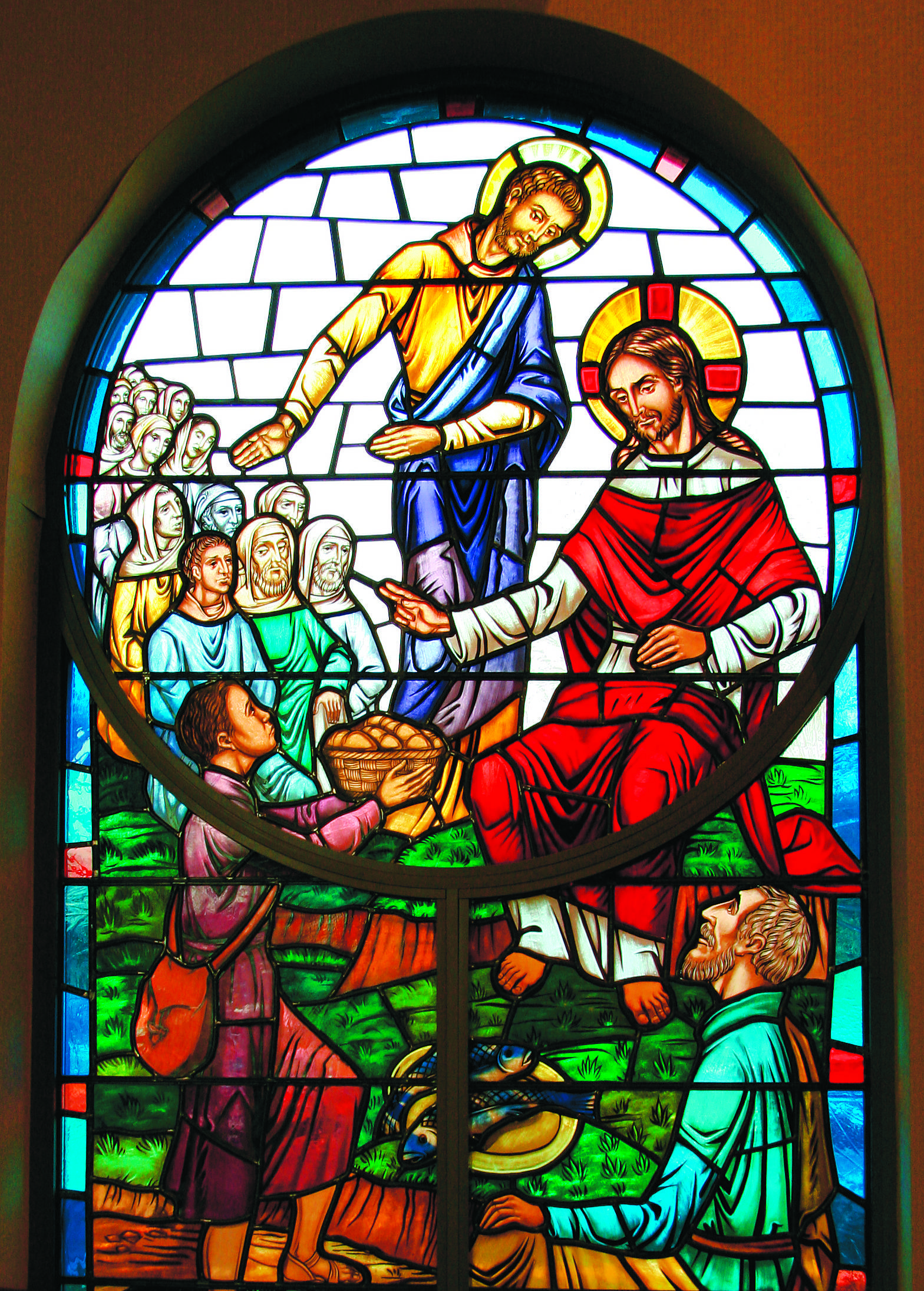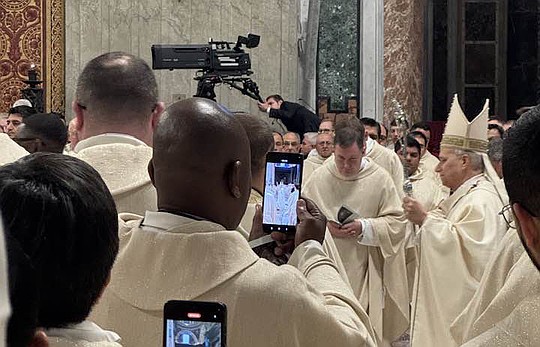Father Koch: The Multiplication of the Loaves and Fish prepares us for the Eucharist
July 26, 2024 at 9:00 a.m.
 For the 17th Sunday in Ordinary Time, Father Garry Koch reflects on the significance of the Multiplication of Loaves and Fish as reflected in this stained glass window in St. Robert Bellarmine Co-Cathedral, Freehold.. File photoGospel reflection for July 28, 2024, 17th Sunday in Ordinary Time
For the 17th Sunday in Ordinary Time, Father Garry Koch reflects on the significance of the Multiplication of Loaves and Fish as reflected in this stained glass window in St. Robert Bellarmine Co-Cathedral, Freehold.. File photoGospel reflection for July 28, 2024, 17th Sunday in Ordinary TimeWe make the shift this weekend from a continuous read through Mark’s Gospel so that over the next five weeks we will be proclaiming the sixth chapter of John’s Gospel instead. This chapter is the Multiplication of the Loaves and Fish. While this miracle is recounted by St. Mark, in fact he has two incidences of such a miracle, we move to John liturgically due to the theological explanation that John gives in addition to the miracle.
As Jesus performed the miracle of the multiplication of the loaves and the fish for the crowd assembled to hear his preaching, he did so as a sign of what was to come. We cannot see this miracle as anything other than a Eucharistic prelude. While in John’s Gospel there is no Institution Narrative at the Last Supper, there is a very clear Eucharistic focus in this chapter. The account of the multiplication of loaves and fish is the most frequently told story in the ministry of Jesus, appearing six times in the four Gospels.
In several ways this miracle is distinct from all the others. The healing miracles of Jesus happened to individual persons, and usually after their need had been expressed to Jesus. He did not perform miracles for random people on the side of the road. The person first had to express some degree of confidence -- call it faith -- that Jesus both could and would grant the healing that the person desired.
This miracle required no expressed faith on the part of anyone. The crowd gathered -- and there were some 5,000 men there who were not looking to be fed, nor had they any expectation of being fed. They had followed Jesus to that deserted place because they wanted to learn from him; to be inspired by him; to find a deeper sense of purpose, and their relationship with God.
The disciples -- Philip and Andrew -- who are the principles in this passage, have no expectation as to what he is going to do. The disciples were not concerned, nor were the people complaining.
Jesus provided food, the very sustenance that the people needed so that they would have the strength to return to their homes.
Some will preach that the miracle here is that Jesus inspired the people there to share with each other the food that they were carrying in their sacks. Nothing does more to undermine the power of this miracle, and certainly the explanation of the meaning of the miracle than does that inanity. Jesus did not teach the people about sharing -- he never even mentioned it. This is a miracle where God himself feeds the crowd, much in the same way that God fed the Israelites in their sojourn through the desert. The two experiences are linked -- not just by John the evangelist, but by Jesus himself. There is an intentionality to Jesus feeding the crowd. While it carries the symbolic notion of him also teaching the crowd - - he feeds them with the word he preaches, he also cares for their physical needs. Feeding the hungry is also one of the mandates of the Kingdom of God that Jesus proclaims. In feeding the crowd he fulfills his own teaching. As he addressed the young man who asked what he needed to do, Jesus said: “sell what you have, and give it to the poor.” Those who followed Jesus here are the poor and those on the margins. Jesus does what he tells his followers to do.
As we will see over the next several weeks as we read through this sixth chapter of the Gospel, Jesus will connect this feeding with his own flesh and Blood, thereby prefiguring the Eucharist. We will be challenged to reflect more clearly on our relationship to Jesus and our sharing in the Eucharist. It is intentional to the planning that the 10th National Eucharistc Congress concluded last week with the pilgrimage in Indianapolis, bringing to a close this time of Eucharistic revival. This period highlighted our awareness of the Eucharistic presence of our Lord with the desired goal to strengthen both our knowledge of and reverence for the Eucharist.
Father Garry Koch is pastor of St. Benedict Parish, Holmdel.
Related Stories
Thursday, January 08, 2026
E-Editions
Events
 For the 17th Sunday in Ordinary Time, Father Garry Koch reflects on the significance of the Multiplication of Loaves and Fish as reflected in this stained glass window in St. Robert Bellarmine Co-Cathedral, Freehold.. File photoGospel reflection for July 28, 2024, 17th Sunday in Ordinary Time
For the 17th Sunday in Ordinary Time, Father Garry Koch reflects on the significance of the Multiplication of Loaves and Fish as reflected in this stained glass window in St. Robert Bellarmine Co-Cathedral, Freehold.. File photoGospel reflection for July 28, 2024, 17th Sunday in Ordinary TimeWe make the shift this weekend from a continuous read through Mark’s Gospel so that over the next five weeks we will be proclaiming the sixth chapter of John’s Gospel instead. This chapter is the Multiplication of the Loaves and Fish. While this miracle is recounted by St. Mark, in fact he has two incidences of such a miracle, we move to John liturgically due to the theological explanation that John gives in addition to the miracle.
As Jesus performed the miracle of the multiplication of the loaves and the fish for the crowd assembled to hear his preaching, he did so as a sign of what was to come. We cannot see this miracle as anything other than a Eucharistic prelude. While in John’s Gospel there is no Institution Narrative at the Last Supper, there is a very clear Eucharistic focus in this chapter. The account of the multiplication of loaves and fish is the most frequently told story in the ministry of Jesus, appearing six times in the four Gospels.
In several ways this miracle is distinct from all the others. The healing miracles of Jesus happened to individual persons, and usually after their need had been expressed to Jesus. He did not perform miracles for random people on the side of the road. The person first had to express some degree of confidence -- call it faith -- that Jesus both could and would grant the healing that the person desired.
This miracle required no expressed faith on the part of anyone. The crowd gathered -- and there were some 5,000 men there who were not looking to be fed, nor had they any expectation of being fed. They had followed Jesus to that deserted place because they wanted to learn from him; to be inspired by him; to find a deeper sense of purpose, and their relationship with God.
The disciples -- Philip and Andrew -- who are the principles in this passage, have no expectation as to what he is going to do. The disciples were not concerned, nor were the people complaining.
Jesus provided food, the very sustenance that the people needed so that they would have the strength to return to their homes.
Some will preach that the miracle here is that Jesus inspired the people there to share with each other the food that they were carrying in their sacks. Nothing does more to undermine the power of this miracle, and certainly the explanation of the meaning of the miracle than does that inanity. Jesus did not teach the people about sharing -- he never even mentioned it. This is a miracle where God himself feeds the crowd, much in the same way that God fed the Israelites in their sojourn through the desert. The two experiences are linked -- not just by John the evangelist, but by Jesus himself. There is an intentionality to Jesus feeding the crowd. While it carries the symbolic notion of him also teaching the crowd - - he feeds them with the word he preaches, he also cares for their physical needs. Feeding the hungry is also one of the mandates of the Kingdom of God that Jesus proclaims. In feeding the crowd he fulfills his own teaching. As he addressed the young man who asked what he needed to do, Jesus said: “sell what you have, and give it to the poor.” Those who followed Jesus here are the poor and those on the margins. Jesus does what he tells his followers to do.
As we will see over the next several weeks as we read through this sixth chapter of the Gospel, Jesus will connect this feeding with his own flesh and Blood, thereby prefiguring the Eucharist. We will be challenged to reflect more clearly on our relationship to Jesus and our sharing in the Eucharist. It is intentional to the planning that the 10th National Eucharistc Congress concluded last week with the pilgrimage in Indianapolis, bringing to a close this time of Eucharistic revival. This period highlighted our awareness of the Eucharistic presence of our Lord with the desired goal to strengthen both our knowledge of and reverence for the Eucharist.
Father Garry Koch is pastor of St. Benedict Parish, Holmdel.










